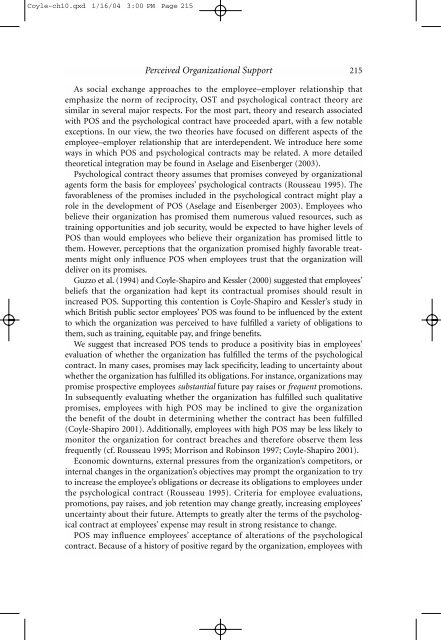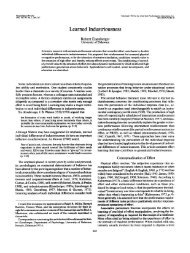Perceived Organizational Support
Perceived Organizational Support
Perceived Organizational Support
You also want an ePaper? Increase the reach of your titles
YUMPU automatically turns print PDFs into web optimized ePapers that Google loves.
Coyle-ch10.qxd 1/16/04 3:00 PM Page 215<br />
<strong>Perceived</strong> <strong>Organizational</strong> <strong>Support</strong> 215<br />
As social exchange approaches to the employee–employer relationship that<br />
emphasize the norm of reciprocity, OST and psychological contract theory are<br />
similar in several major respects. For the most part, theory and research associated<br />
with POS and the psychological contract have proceeded apart, with a few notable<br />
exceptions. In our view, the two theories have focused on different aspects of the<br />
employee–employer relationship that are interdependent. We introduce here some<br />
ways in which POS and psychological contracts may be related. A more detailed<br />
theoretical integration may be found in Aselage and Eisenberger (2003).<br />
Psychological contract theory assumes that promises conveyed by organizational<br />
agents form the basis for employees’ psychological contracts (Rousseau 1995). The<br />
favorableness of the promises included in the psychological contract might play a<br />
role in the development of POS (Aselage and Eisenberger 2003). Employees who<br />
believe their organization has promised them numerous valued resources, such as<br />
training opportunities and job security, would be expected to have higher levels of<br />
POS than would employees who believe their organization has promised little to<br />
them. However, perceptions that the organization promised highly favorable treatments<br />
might only influence POS when employees trust that the organization will<br />
deliver on its promises.<br />
Guzzo et al. (1994) and Coyle-Shapiro and Kessler (2000) suggested that employees’<br />
beliefs that the organization had kept its contractual promises should result in<br />
increased POS. <strong>Support</strong>ing this contention is Coyle-Shapiro and Kessler’s study in<br />
which British public sector employees’ POS was found to be influenced by the extent<br />
to which the organization was perceived to have fulfilled a variety of obligations to<br />
them, such as training, equitable pay, and fringe benefits.<br />
We suggest that increased POS tends to produce a positivity bias in employees’<br />
evaluation of whether the organization has fulfilled the terms of the psychological<br />
contract. In many cases, promises may lack specificity, leading to uncertainty about<br />
whether the organization has fulfilled its obligations. For instance, organizations may<br />
promise prospective employees substantial future pay raises or frequent promotions.<br />
In subsequently evaluating whether the organization has fulfilled such qualitative<br />
promises, employees with high POS may be inclined to give the organization<br />
the benefit of the doubt in determining whether the contract has been fulfilled<br />
(Coyle-Shapiro 2001). Additionally, employees with high POS may be less likely to<br />
monitor the organization for contract breaches and therefore observe them less<br />
frequently (cf. Rousseau 1995; Morrison and Robinson 1997; Coyle-Shapiro 2001).<br />
Economic downturns, external pressures from the organization’s competitors, or<br />
internal changes in the organization’s objectives may prompt the organization to try<br />
to increase the employee’s obligations or decrease its obligations to employees under<br />
the psychological contract (Rousseau 1995). Criteria for employee evaluations,<br />
promotions, pay raises, and job retention may change greatly, increasing employees’<br />
uncertainty about their future. Attempts to greatly alter the terms of the psychological<br />
contract at employees’ expense may result in strong resistance to change.<br />
POS may influence employees’ acceptance of alterations of the psychological<br />
contract. Because of a history of positive regard by the organization, employees with



